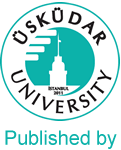Article
Makale
Risk Toplumunda Yaşlılık: Yaşlılıkta Dijital Teknoloji Kullanımı ve Dijital Bölünme Riski
Aging in a Risk Society: Digital Technology Use and the Risk of Digital Divide in Old Age
Hüseyin KOÇAK,Muhammet KESKİN
Year 7, Issue 14, Pages:318-344
This study examines the relationship between older individuals’ use of digital technology and the digital divide concept based on the risk society approach. Risk society is an approach first proposed by Ulrich Beck and later developed by Anthony Giddens through the concepts of ‘risk’ and ‘late modernity’. Based on the idea of ‘risk society’, risk society theory refers to a theoretical framework that focuses on the increase in risks in modern societies and the social, economic, and political consequences of these risks. In this context, the research is based on the idea that risks and uncertainties are increasing in modern societies, which Giddens and Beck put forward in their studies. The risk society approach is critical for understanding and managing the risks faced by contemporary society, which is at the center of demographic aging. In the modern age, older people may face problems in many areas, such as environmental, health, financial, social, psychological, and technological risks. Based on the theory of risk society, this study examines the interaction of elderly individuals with digital technology in today's societies, the effects of digitalization on quality of life, and the risks they face in the digital world from a sociological perspective with a theoretical approach. In addition, within the scope of the research, the data sets of the Household Information Technology (IT) Usage Survey of the Turkish Statistical Institute (TURKSTAT) were analyzed, and the effects of the digital divide on elderly individuals were detailed. Furthermore, through a literature review, the relationship between the risk of the digital divide, the efforts of elderly individuals to adapt to digital technologies, and the barriers they face in this process with the social structure were investigated. According to the research results, variables such as age, gender, education level, and economy are among the most significant factors affecting the tendency of elderly individuals to use digital and information technologies. These factors also affect access to technology, attitudes towards technology, cognitive abilities, and utilization of social support networks.
Bu çalışma, yaşlı bireylerin dijital teknoloji kullanımı ile dijital bölünme kavramı arasındaki ilişkiyi risk toplumu yaklaşımı temelinde incelemektedir. Risk toplumu, ilk olarak Ulrich Beck tarafından ortaya atılan ve daha sonra Anthony Giddens tarafından ‘risk’ ve ‘geç modernite’ kavramları üzerinden geliştirilen bir yaklaşımdır. “Risk toplumu” fikrine dayanan risk toplumu teorisi, modern toplumlarda risklerin artışına ve bu risklerin sosyal, ekonomik ve siyasi sonuçlarına odaklanan teorik bir çerçeveyi ifade etmektedir. Bu bağlamda araştırma, Giddens ve Beck’in çalışmalarında ortaya koydukları modern toplumlarda risk ve belirsizliklerin arttığı fikrine dayanmaktadır. Risk toplumu yaklaşımı, demografik yaşlanmanın merkezinde yer alan çağdaş toplumun karşılaştığı riskleri anlamak ve yönetmek için kritik önem taşımaktadır. Modern çağda yaşlı insanlar çevresel, sağlık, finansal, sosyal, psikolojik ve teknolojik riskler gibi birçok alanda sorunlarla karşılaşabilmektedir. Risk toplumu teorisinden yola çıkan bu çalışma, günümüz toplumlarında yaşlı bireylerin dijital teknoloji ile etkileşimini, dijitalleşmenin yaşam kalitesi üzerindeki etkilerini ve dijital dünyada karşılaştıkları riskleri teorik bir yaklaşımla sosyolojik bir perspektiften incelemektedir. Buna ek olarak, araştırma kapsamında Türkiye İstatistik Kurumu’nun (TÜİK) Hanehalkı Bilişim Teknolojileri (BT) Kullanım Araştırması veri setleri analiz edilerek dijital bölünmenin yaşlı bireyler üzerindeki etkileri detaylandırılmıştır. Ayrıca literatür taraması ile dijital bölünme riski, yaşlı bireylerin dijital teknolojilere uyum sağlama çabaları ve bu süreçte karşılaştıkları engellerin toplumsal yapı ile ilişkisi araştırılmıştır. Araştırma sonuçlarına göre yaş, cinsiyet, eğitim düzeyi ve ekonomi gibi değişkenler yaşlı bireylerin dijital ve bilişim teknolojilerini kullanma eğilimlerini etkileyen en önemli faktörler arasında yer aldığı anlaşılmıştır. Bu faktörler aynı zamanda teknolojiye erişim, teknolojiye yönelik tutumlar, bilişsel yetenekler ve sosyal destek ağlarının kullanımını da etkilemektedir.

